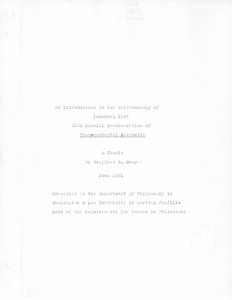| dc.rights.license | In Copyright | en_US |
| dc.creator | Gray, Grayfred Bethea | |
| dc.date.accessioned | 2023-10-20T18:01:19Z | |
| dc.date.available | 2023-10-20T18:01:19Z | |
| dc.date.created | 1961 | |
| dc.identifier | WLURG038_Gray_thesis_1961 | |
| dc.identifier.uri | https://dspace.wlu.edu/handle/11021/36508 | |
| dc.description.abstract | In the Critique of Pure Reason Immanuel Kant attempts to resolve the problem of how it is possible for men to make synthetic a priori judgments. This was a problem which had been developing in his thinking for many years. His encounter with Hume's attack on the principle of causality, however, brought his thinking face to face vith a threat to all knowledge, a threat
which he wss compelled to challenge. Kant was the first to realize fully the implications of Hume's analysis: he came to tne conclusion that, if the Humian analysis of causality were correct, a similar analysis would eliminate all certainty in mathematics and in all science. All empirical knowledge would be reduced to a skeptical morass from which there was no escape. Kant set for himself the task of saving man's knowledge from
this fate. Human knowledge may be divided into two basic types: a oosteriori and a priori. Hume had acknowledged the limited validity of a posteriori knowledge which is that
knowledge derived from experience. Such a posteriori knowledgeh had one crucial weakness: it was always contingent and uncertain. Kant agreed with him on this point. "The fundamental presupposition upon which Kant's argument rests -- a presupposition never itself investigated but always assumed -- is that universality and necessity cannot be reached by any process that is empircal in character." [From introductory section] | en_US |
| dc.format.extent | 58 pages | en_US |
| dc.language.iso | en_US | en_US |
| dc.rights | This material is made available for use in research, teaching, and private study, pursuant to U.S. Copyright law. The user assumes full responsibility for any use of the materials, including but not limited to, infringement of copyright and publication rights of reproduced materials. Any materials used should be fully credited with the source. | en_US |
| dc.rights.uri | http://rightsstatements.org/vocab/InC/1.0/ | en_US |
| dc.subject.other | Washington and Lee University -- Honors in Philosophy | en_US |
| dc.title | An Introduction to the Epistemology of Immanuel Kant: With Special Consideration of Transcendental Aesthetic | en_US |
| dc.type | Text | en_US |
| dcterms.isPartOf | WLURG038 - Student Papers | en_US |
| dc.rights.holder | Gray, Grayfred Bethea | en_US |
| dc.subject.fast | Kant, Immanuel, 1724-1804 | en_US |
| dc.subject.fast | Knowledge, Theory of | en_US |
| local.department | Philosophy | en_US |
